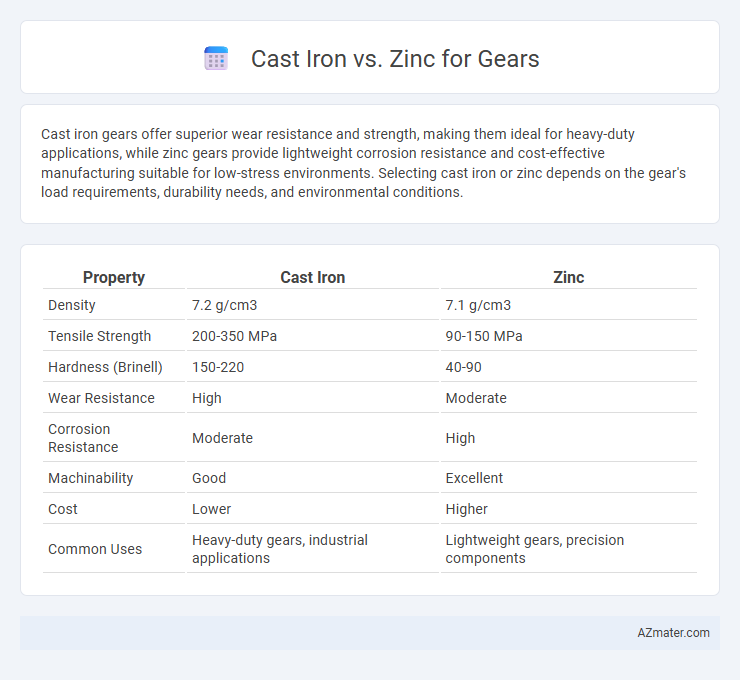Cast iron gears offer superior wear resistance and strength, making them ideal for heavy-duty applications, while zinc gears provide lightweight corrosion resistance and cost-effective manufacturing suitable for low-stress environments. Selecting cast iron or zinc depends on the gear's load requirements, durability needs, and environmental conditions.
Table of Comparison
| Property | Cast Iron | Zinc |
|---|---|---|
| Density | 7.2 g/cm3 | 7.1 g/cm3 |
| Tensile Strength | 200-350 MPa | 90-150 MPa |
| Hardness (Brinell) | 150-220 | 40-90 |
| Wear Resistance | High | Moderate |
| Corrosion Resistance | Moderate | High |
| Machinability | Good | Excellent |
| Cost | Lower | Higher |
| Common Uses | Heavy-duty gears, industrial applications | Lightweight gears, precision components |
Introduction to Gear Materials
Cast iron and zinc are common materials used in gear manufacturing due to their distinct mechanical properties and cost-effectiveness. Cast iron offers excellent wear resistance and high compressive strength, making it ideal for heavy-duty gear applications requiring durability and load-bearing capacity. Zinc provides superior corrosion resistance and easier castability, suitable for precision gears in low-stress environments where lightweight and cost savings are prioritized.
Overview of Cast Iron Gears
Cast iron gears offer exceptional wear resistance and high compressive strength, making them ideal for heavy-duty applications that require durability and load-bearing capacity. The material's excellent machinability and vibration damping properties reduce operational noise and enhance gear longevity. Cast iron's cost-effectiveness and ability to withstand harsh environments contribute to its widespread use in industrial gear manufacturing.
Overview of Zinc Gears
Zinc gears offer excellent corrosion resistance and good dimensional stability, making them suitable for low to moderate load applications in automotive and industrial machinery. Their lightweight nature reduces overall gear assembly weight compared to cast iron, improving efficiency in precision instruments and small power transmissions. Zinc alloys also provide superior machinability and surface finish, enhancing gear performance and longevity in environments where wear resistance is critical.
Mechanical Strength Comparison
Cast iron exhibits superior mechanical strength compared to zinc, making it ideal for heavy-duty gear applications requiring high wear resistance and load-bearing capacity. Zinc alloys, while offering excellent corrosion resistance and ease of casting, generally possess lower tensile strength and are more prone to deformation under stress. The higher hardness and fatigue resistance of cast iron gears ensure longer service life in demanding mechanical environments.
Wear and Durability
Cast iron gears exhibit superior wear resistance and durability due to their high hardness and excellent damping properties, making them ideal for heavy-duty applications under high loads. Zinc gears, while offering good corrosion resistance and easier manufacturability, generally have lower wear resistance and tend to deform faster under stress, limiting their lifespan in demanding environments. For applications requiring long-term durability and minimal wear, cast iron remains the preferred material choice.
Corrosion Resistance
Cast iron offers moderate corrosion resistance due to its carbon content, but it can rust when exposed to moisture and air without protective coatings. Zinc provides superior corrosion resistance as it forms a stable, protective oxide layer that prevents further degradation, making it ideal for harsh environments. For gears requiring long-term durability in corrosive conditions, zinc alloys or zinc-coated cast iron are often preferred to enhance lifespan and performance.
Weight and Machinability
Cast iron gears offer higher weight compared to zinc due to their greater density, contributing to enhanced durability and load-bearing capacity in heavy-duty applications. Zinc gears are significantly lighter, benefiting applications where weight reduction is critical without compromising moderate strength. Machinability favors zinc, as it is easier to cast and shape, while cast iron requires more precise machining techniques due to its hardness and brittleness.
Cost Analysis
Cast iron gears typically offer lower upfront costs due to inexpensive raw materials and well-established manufacturing processes, making them cost-effective for large-scale production. Zinc gears, although generally more expensive in material costs, provide advantages in reduced weight and corrosion resistance, potentially lowering maintenance expenses over time. Evaluating total lifecycle costs, including fabrication, performance, and durability, is crucial to determine the optimal choice between cast iron and zinc for specific gear applications.
Applications and Suitability
Cast iron gears excel in heavy-duty applications requiring high strength, wear resistance, and vibration damping, such as industrial machinery and automotive transmissions. Zinc gears are ideal for lightweight, low-load applications like consumer electronics and small appliances due to their corrosion resistance and ease of casting. Selecting between cast iron and zinc depends on load capacity, environmental exposure, and manufacturing cost considerations.
Conclusion: Choosing the Right Material
Cast iron offers superior strength and wear resistance ideal for heavy-duty gear applications, while zinc provides excellent corrosion resistance and lighter weight suited for precision mechanisms. Analyzing operational environments and load requirements determines the optimal gear material, balancing performance and cost-efficiency. Prioritizing application-specific factors ensures the right gear material selection, enhancing durability and functionality in mechanical systems.

Infographic: Cast iron vs Zinc for Gear
 azmater.com
azmater.com